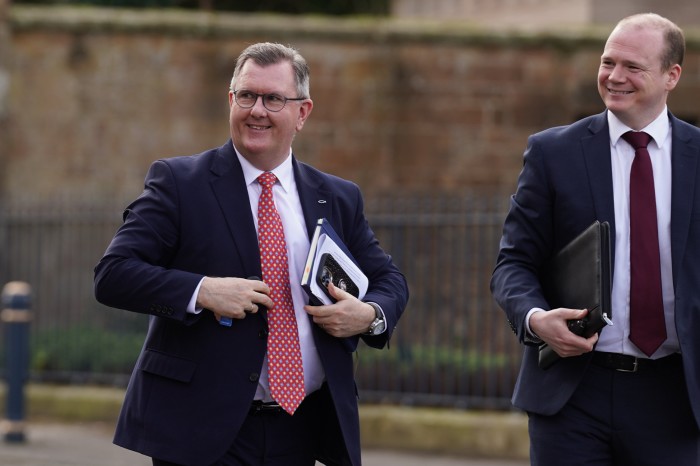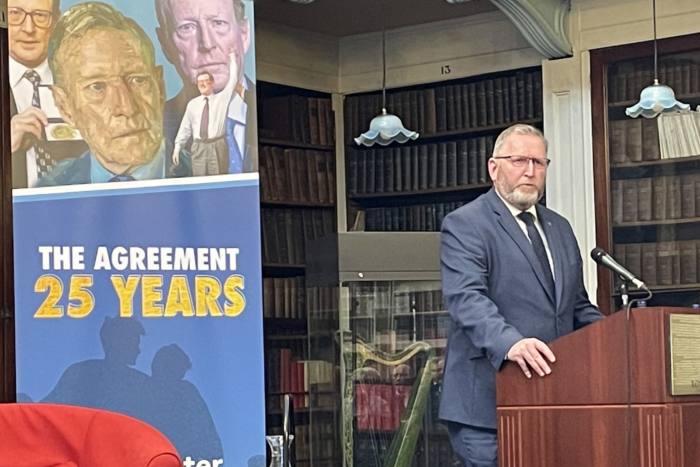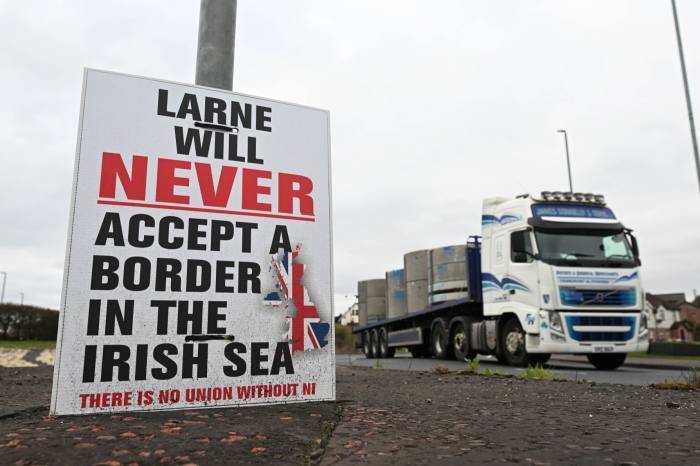[ad_1]
London and Brussels have signed into law a Brexit deal for Northern Ireland but one of the problems it was supposed to fix — months of political paralysis in the region — remains as intractable as ever.
Northern Ireland’s biggest unionist party has been boycotting the region’s political institutions since May to oppose post-Brexit trade rules.
After the EU and UK ratified the hard-fought Windsor framework last week, the Democratic Unionist Party’s leverage with the British government has shrunk — yet it is still demanding more concessions.
Senior unionists believe it will be forced to climb down and will eventually end its boycott of the Stormont assembly and power-sharing executive. But despite overwhelming cross-party support at Westminster for the deal, exasperation from London with the DUP and a worsening financial crisis in Northern Ireland, few expect a speedy resolution.
“The issue now is timing — they probably will not do anything before council elections in May, then it’s the [annual traditional] loyalist marching season, so you could be looking at September or October before anything moves again,” warned a senior unionist official.
By then Northern Ireland could be facing what first minister designate Michelle O’Neill of the pro-Irish Unity Sinn Féin party called “savage” cuts to public services in one of the poorest regions of the UK, with the country’s longest health service waiting lists.
The Northern Ireland Fiscal Council, an independent body overseeing the region’s finances, on Tuesday warned that the region faced a 6.4 per cent cut in departmental spending in the year ahead.
Brexit left Northern Ireland inside the EU’s single market for goods. But it put a customs border in the Irish Sea to avoid re-erecting a politically sensitive land border in a region scarred by three decades of conflict.
DUP leader Sir Jeffrey Donaldson objects to some EU law remaining in place in Northern Ireland, which he says undermines the region’s status within UK and its internal market.
He said he was looking forward to more talks with the UK government to “sort out” continuing problems with the Windsor framework and return to Stormont. “I’m not a quitter,” he said.
London, however, insists that negotiations are over. “The British government has bent over backwards for them . . . the ball is in their court,” said one senior Conservative MP.
Donaldson says his hardline strategy has been vindicated and the Windsor framework, which eliminates customs checks for goods from Britain that stay in the region, represents significant progress.
But he called it a “sticking plaster”, not a solution, and said unionists had to back the deal or there would be no solid basis to restore power-sharing.
Gregory Campbell, a DUP MP, echoed his party leader. “How many agreements and deals have become ‘international law’ only to be replaced by further deals and agreements . . . because there was a realisation that the earlier models were not fit for purpose?” he said.
However, Doug Beattie, leader of the small Ulster Unionist Party, said Donaldson was a pragmatist. “It’s not if [they return to Stormont], it’s about when.”
He added that there were two problems with continuing to hold out.
First, the Stormont brake — a mechanism that would allow unionists to object to the imposition of new EU trade law — would be unavailable if the assembly remained paralysed. In that case, “EU law will automatically apply — they’d be cutting off their nose to spite their face,” Beattie said.
Second, the prolonged absence of Stormont would not result in direct rule from London as it did before power sharing in the region. There is an understanding that Ireland would have a greater role, which would be anathema to unionists.
Niamh Gallagher, a lecturer in British and Irish history at the University of Cambridge, said the DUP had made a calculation to placate hardline voters, but it was a “risky strategy” electorally.
While a recent Lucid Talk poll found that three-quarters of DUP voters opposed the Windsor deal, a new survey for the Irish News by the University of Liverpool’s Institute of Irish Studies found nearly three times more unionists backed the Windsor framework than rejected it.
Pete Shirlow, the Institute’s head, said the DUP appeared to be clawing back support lost to the hardline Traditional Unionist Voice party in last May’s elections.
But moderate voters had not returned. “You’re not going to get these people back by shouting ‘no surrender’,” he added.
Donaldson has appointed a panel to canvass unionist opinion on the Windsor framework that is due to report back this week.
It is led by former DUP first minister Peter Robinson, who has already said unionists must weigh whether rejecting the deal will “place unionism and Northern Ireland on more perilous ground”.
But Bertie Ahern, a former Irish taoiseach who has been liaising with unionists, urged London to consider “if there’s a little bit more clarification of a tweaking . . . to get this across the line . . . because the alternative is just crazy”.
[ad_2]
Source link




